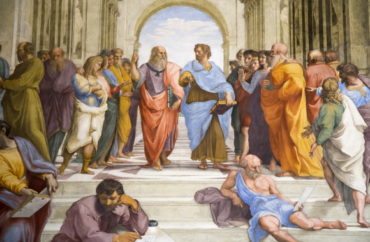
Several alternatives are emerging supported by dissident educators to combat a diminished intellectual life on college campuses.
The details of this intellectual revolt are spelled out in a February 26 article in The Economist headlined “Pushback at cancel culture is leading to new educational initiatives.”
It quotes Stanford historian Niall Ferguson as pointing out that it’s not just conservatives who are rejecting “‘totalitarianism lite’ on campus.” A significant number of liberal or heterodox faculty feel dominated by a rigid, intolerant and all-pervading ideology centered on narrow conceptions of power and identity.
Many academics at elite universities “feel the need to self-censor,” according to a January report by The Legatum Institute.
The Economist also cited a study by the American Council of Trustees and Alumni which found that, from 2010 to 2018, spending on student services and administration accelerated beyond spending on academic instruction, as well as an August 2021 report by the conservative Heritage Foundation which found that the average institution has more than 45 people employed in promoting “diversity, equity and inclusion.” The ideologies promoted by DEI administrators are gaining power, and outpacing academic freedom.
Some educators are responding to the crisis of stifled inquiry and enforced orthodoxy by championing new approaches. The Economist described three alternative models that educators are reinforcing or building from scratch.
First, religious colleges often stand against ideological conformity and groupthink, perhaps because their faith commitments teach them that there is truth to be found, not merely a political agenda to be advanced.
The Economist quoted political scientist Bruce Gilley at Portland State University: “The people who still believe in truth are often people who come out of faith traditions, who believe that there is a truth.”
The publication wrote that some religious schools – such as Hillsdale College in Michigan, where Bryn Mawr College exile Jane Kitchen unexpectedly found an academic home – have sturdily resisted ideological takeover.
These colleges have withstood the ideological dictates du jour, enforced elsewhere by a growing corps of diversicrats, in part because they have preserved a curriculum rooted in the Western philosophical canon, which has truth-seeking at its core.
In a second approach, The Economist reports, is a cadre of committed scholars trying to reform the academy from the inside with the bipartisan, political spectrum-spanning Heterodox Academy.
The group, founded in 2015, now includes 5,500 members. The organization claims that membership in its ranks is “meaningful because it is public,” and it boasts a roster of faculty, administrators and staff at higher education institutions and K-12 schools willing to make their affiliation known.
Heterodox Academy sponsors workshops and conferences for the sake of advancing “open inquiry, viewpoint diversity and constructive disagreement” on members’ home campuses.
Robert George, the conservative Catholic scholar and professor at Princeton University, wrote that “no organization in the history of American academic life…is doing more to promote the basic freedoms and viewpoint diversity we urgently need in our colleges and universities today.”
A third group of educators fleeing from ‘totalitarianism lite’ are staking out new frontiers.
The academic pioneers committed to the University of Austin, a new university planned for the Texas capital, think “the academy cannot be saved,” The Economist wrote.
Ferguson, as well as economist Glenn Loury and psychologist Jonathan Haidt, are involved. Its founders have said they will “resist the identity politics that they believe has captured mainstream academia,” the publication reported. Its president, Pano Kanelos, formerly of St. John’s College in Annapolis, said it has raised $90 million.
Education “startup” Ralston College in Georgia argues internal reform of higher education is a “losing battle,” The Economist reports. Some speculate Jordan Peterson could take on a leadership role there.
“Most colleges and universities are no longer places where freedom of inquiry, and the freedom of speech on which free inquiry depends, are protected, let alone celebrated,” Ralston states on its website. “Nevertheless, our vocation is not critique, but to show another way.”
Ralston will accept its first graduate students in Fall 2022.
Ralston’s president, Stephen Blackwood, frankly acknowledges the challenges faced by educators and students who still cherish liberal education.
“We can’t take for granted that our fundamental freedoms, of speech, conscience and association, will still be there 20 years from now,” Blackwood told The Economist.
“The ideological presumptions and weaponised activism that universities now teach are a closing of our horizons. The work of our time is to open those horizons up again.”
Read The Economist article here.
MORE: ‘Its north star is truth’: University of Austin founders move forward





Please join the conversation about our stories on Facebook, Twitter, Instagram, Reddit, MeWe, Rumble, Gab, Minds and Gettr.